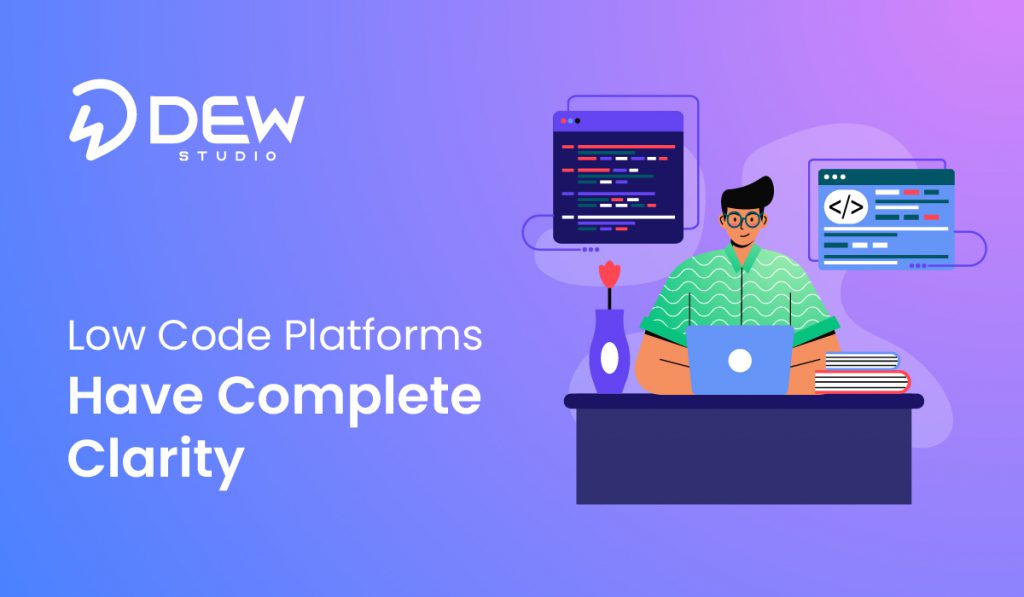
Are you ready to use the power and trends in low-code development to transform your software applications? With the low-code development gaining rapid momentum, individuals and organisations are increasingly using its capabilities to streamline application development.
In fact, according to a recent study by Forrester, the low-code development platform market is projected at a rate of 40% annually, reaching $21.2 billion by 2022.
As we look towards the future of low-code development services, there are many emerging trends in the integration of artificial intelligence (AI) and machine learning (ML) capabilities into low-code platforms.
These innovations are set to further revolutionise software development , helping Businesses and individuals from different industries with limited coding expertise to create sophisticated and powerful applications.
In this blog, we will explore some of these trends in low code development and discuss what the future holds for low-code development.
1. Increased Adoption Across Industries
One of the most noticeable trends we can expect in the low-code landscape is the increased adoption across various industries. Companies that initially hesitated to embrace low-code platforms will see the value and speed they provide, leading to wider acceptance.
For example, in the healthcare industry, low-code platforms are being utilised to build custom applications for patient management, telemedicine, and healthcare analytics. These platforms enable healthcare professionals to tailor applications to their specific needs without extensive coding knowledge, resulting in faster and more efficient healthcare delivery.
- Emerging Technology: Blockchain integration for secure and transparent data management.
Companies Utilising It:
- IBM is utilising low-code platforms with blockchain integration for transparent and efficient supply chain management applications. This combination enables real-time tracking of products, ensures authenticity, and reduces fraud in the supply chain.
2. Integration with Artificial Intelligence and Machine Learning
Artificial Intelligence (AI) and Machine Learning (ML) have quickly become key drivers of innovation and digital transformation. In the low-code space, we can expect integration with AI and ML to become increasingly common.
For instance, low-code platforms will feature pre-built AI and ML components that can be easily integrated into applications. One example is using low-code platforms to build chatbot applications that use AI to provide personalized customer service and automate routine inquiries, enhancing the overall customer experience.
- Emerging Technology: Natural Language Processing (NLP) for conversational interfaces and data analysis.
Companies Utilising It:
- Salesforce is incorporating low-code platforms with NLP-powered chatbots for enhanced customer service experiences. These chatbots can understand and respond to natural language inquiries, providing personalized support.
3. Expansion of Mobile Development Capabilities
The demand for mobile applications continues to grow rapidly, with users relying heavily on smartphones and tablets for various tasks. Low-code platforms are expected to keep up with this trend by expanding their mobile development capabilities.
For instance, low-code platforms will provide comprehensive toolsets and templates specifically designed for mobile app development services. An example of this is the use of low-code platforms to create mobile applications for field service management, enabling organizations to streamline their field operations and improve the efficiency of their mobile workforce.
- Emerging Technology: Progressive Web Apps (PWAs) for cross-platform and offline-capable web applications.
Companies Utilising It:
- Starbucks has utilised low-code platforms with PWA capabilities to develop a cross-platform mobile ordering app. The app provides a seamless experience for users across different devices and works offline, enhancing customer convenience.
4. Enhanced Collaboration and Teamwork
Collaboration and teamwork are essential for successful software development projects. Low-code platforms will continue to improve in this aspect, providing enhanced collaboration features to support the entire development lifecycle.
For example, low-code platforms will offer features like real-time co-editing, version control, and project management capabilities. This includes the use of low-code platforms to enable geographically dispersed teams to collaborate in real-time on application development projects, leading to faster delivery and better alignment across teams.
- Emerging Technology: Augmented Reality (AR) and Virtual Reality (VR) for immersive team collaboration and training scenarios.
Companies Utilising It:
- Bosch has integrated low-code platforms with AR/VR features to develop immersive training simulations for factory workers. This enables hands-on training in a virtual environment, improving learning outcomes.
5. Focus on Security and Governance
With the increasing reliance on low-code platforms, ensuring the security and governance of applications built using these platforms will be of paramount importance. Vendors will invest heavily in enhancing the security features of their low-code platforms, providing robust protection against cyber threats. Additionally, improved governance capabilities will be implemented to ensure compliance with industry regulations and data privacy standards.
For example, low-code platforms will offer built-in security features such as role-based access control, data encryption, and compliance reporting, ensuring that applications developed on these platforms adhere to industry standards and regulations.
- Emerging Technology: Zero-trust security frameworks for enhanced data protection and access control.
Companies Utilising It:
- Capital One is applying low-code platforms with built-in zero-trust security features for developing internal financial tracking and reporting applications. This approach ensures secure access to sensitive financial data.
6. Integration with Legacy Systems
Many organizations still rely on legacy systems to run critical business operations. Therefore, low-code platforms will evolve to seamlessly integrate with existing legacy systems. Connecting these systems with modern low-code applications will enable businesses to leverage the power of their legacy infrastructure while gaining the benefits of low-code development.
For instance, Manufacturing companies use a low-code platform to integrate its legacy ERP system with a modern low-code application, leading to improved efficiency in production planning and inventory management.
- Emerging Technology: Robotic Process Automation (RPA) for seamless integration with legacy systems and automating repetitive tasks.
Companies Utilising It:
- Cerner Corporation use low-code platforms with RPA capabilities to integrate with legacy electronic health record systems. This integration streamlines administrative processes and improves data accuracy.
7. Democratization of Development
Low-code development has always aimed to democratize software development by making it accessible to a wider audience. Going forward, we can expect this trend to accelerate. Low-code platforms will become even more user-friendly, with intuitive drag-and-drop interfaces, visual modelling tools, and pre-built components.
For example, Business users without coding expertise used a low-code platform to develop a custom supply chain management application tailored to the organisation’s specific needs, leading to improved visibility and efficiency in the supply chain processes.
- Emerging Technology: Augmented Development using AI-driven code suggestions and automation.
Companies Utilising It:
- Microsoft has implemented low-code platforms with AI-driven code suggestion features, enabling non-technical employees to actively participate in the development of internal productivity tools and applications.
Conclusion
The future of low-code development holds immense potential for individuals and organisations alike.
Whether you are a business looking to streamline your application development processes or an individual with little to no coding experience, low-code platforms offer an efficient and effective solution.
To start on your low-code development journey, consider contacting leading service providers like DewStudio subsidiary of TechRev. Contact us today to start your low-code journey to help your business to become ×2 productive.


